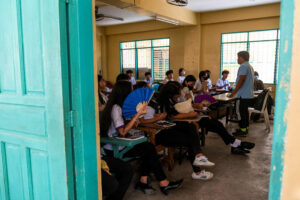Teacher training crucial to better student performance
THE PHILIPPINE government should improve literacy, numeracy, and skill programs for teachers to improve the performance of Filipino students in international assessments, according to the Second Congressional Commission on Education (EDCOM 2) and an education expert from the World Bank. Literacy and numeracy skills at early grade levels are crucial to building learning foundations to […]

THE PHILIPPINE government should improve literacy, numeracy, and skill programs for teachers to improve the performance of Filipino students in international assessments, according to the Second Congressional Commission on Education (EDCOM 2) and an education expert from the World Bank.
Literacy and numeracy skills at early grade levels are crucial to building learning foundations to upskill Filipino students and help them keep up with other students around the world, EDCOM 2 said in a statement on Wednesday, citing recommendations from World Bank education specialist Diego L. Bazaldua.
“Bazaldua emphasized that to ensure the success of such changes, learning materials must be aligned with the new curriculum, and teachers must be trained accordingly,” it said.
“Achieving substantial improvements in international assessments like PISA (Programme on International Student Assessment) requires years of focused and sustained efforts.”
Since August last year, the Department of Education has been implementing the Matatag curriculum, which seeks to streamline learners’ education by focusing on reading, literacy, and numeracy in the first three schooling years of a student.
Filipino students were among the weakest globally in mathematics, reading and science, based on the 2022 PISA. The Philippines ranked 77th out of 81 countries, performing worse than the global average.
It was 63rd out of 64 countries in the PISA assessment that ranked 15-year-old students worldwide in producing and evaluating original ideas that would translate into effective solutions. — J.V.D. Ordoñez












